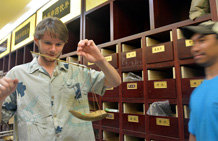
Insurance to go nationwide for critical illnesses
Source: en.nhfpc.gov.cn
Updated: 2015-07-28
Medical insurance to cover expenses for critical illnesses will see its realm expanded to the whole country “before the end of this year” to help financially challenged residents, a State Council executive meeting said on July 22.
The meeting, presided over by Premier Li Keqiang, decided that an urban and rural resident insurance for major illnesses will “cover all subscribers to the urban and rural resident basic medical insurance as of the end of 2015”.
Such insurance coverage “marks a major innovation in the ongoing medical reform” as it combines social security with commercial insurance, the meeting said.
For the insurance, a certain ratio or quantity of funds will be taken from the urban area resident basic medical insurance and the new rural cooperative medical system.
At least 50 percent of the expenditure, which was previously paid by the patients, will be reimbursed by the major illness insurance, and “such a proportion will be gradually increased in future” to effectively reduce the burden on such patients, according to the meeting.
The system is expected to be fully functional by 2017.
The insurance scheme will be run by commercial insurance agencies chosen by the government through bidding. Such agencies will be required to achieve a balanced budget and make slight profits, and ensure capital adequacy and payment capacity.
Also, coordination between the insurance and other systems such as social assistance will “secure minimum well-being and effectively avert the impact of high medical expenses on households”, the meeting decided.
Random checks to boost market order
The meeting decided that the use of random checks will be expanded as an innovative approach by supervisory and regulatory bodies to “create fair market conditions”.
Widespread use of random checks will be significant in eliminating the casual approach taken during administrative inspection, law enforcement actions will see greater transparency, and market players will have greater incentive to conform to the laws, the meeting noted.
According to the meeting, no check not required by any law or regulation can be made, and the items for scrutiny should be released by the regulatory departments for verification.
A “two-way random check” mechanism will be established to make sure both the parties under scrutiny and the inspectors are chosen randomly, and “the regularity bodies’ discretionary power will be strictly limited”.
Results of such checks will be revealed in a timely manner to the public and will be linked with the social credit system. Credit files, joint punishment against violations as well as a blacklist system will be established to free the market players from arbitrary law-enforcement actions.
Boost agricultural development
The meeting announced measures to boost the transformation of agricultural development.
* Expand effective irrigated area among farmland of medium and low production capacity to boost food security. Create better links to market demand and optimize agricultural structures.
* Boost operations that run within appropriate scale and have multiples approaches, nurture new types of entities, strengthen protection over farmland, guide farmers to contracting lands in a lawful and orderly manner, encourage large-scale planting, breeding, product processing and agricultural services, advance the integrated development of production, processing, logistics and marketing, and extend the value chain.
* Extend scientific and technological support to agriculture, implement the project to modernize planting, press ahead with the mechanization of agriculture, promote international cooperation, and enhance comprehensive competitiveness and anti-risk capacity.
* Energetically develop water-saving agriculture, expand standardization in agricultural production, and strengthen efforts in utilizing waste and eliminating pollution.

World Family Summit
The World Family Organization was founded in Europe in 1947 and headquartered in Paris.
Link: China's Central Government / World Health Organization / United Nations Population Fund / UNICEF in China
Copyright 2014 National Health and Family Planning Commission of the PRC All rights reserved






